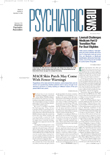Psychiatrists and other physicians are volunteering to help survivors of the September hurricanes that struck Louisiana, Mississippi, Alabama, and Texas, but at least one organization has added another track to assist mental health care consumers.
At the request of a Substance Abuse and Mental Health Services Administration (SAMHSA) project officer, the National Empowerment Center (NEC) of Lawrence, Mass., helped organize sessions in Louisiana to train mental health consumers in peer-support techniques they could take back to their communities as adjuncts to services provided by traditional mental health care providers.
NEC is a technical assistance center funded by SAMHSA. SAMHSA defines“ consumers” as individuals, 18 years of age or older, with severe mental illness.
Louisiana has encouraged the development of consumer-run services modeled on a similar program in Georgia since March 2004, said Cheryl Bowers-Stephens, M.D., assistant secretary of the Louisiana Department of Health and Hospitals' Office of Mental Health, in an interview.
Members of Meaningful Minds of Louisiana (MML), a consumer group, organized Louisiana Consumers for Recovery after Katrina hit and identified 45 trainees. Despite the destruction following Katrina and Rita, the consumers found housing and training sites for the program in New Orleans, Baton Rouge, and Lafayette.
“Everything was a challenge, logistically, bureaucratically, organizationally,” said Daniel Fisher, M.D., Ph.D., codirector of NEC.
Recovery from disaster and trauma are similar to recovery from mental illness, suggested Fisher. Just as restoring problem-solving and executive function are keys to an individual's rehabilitation, so people whose lives were disrupted by the storm face regaining control. That must be coupled with social reintegration of communities as evacuees return to their homes, he said. “If they don't develop a social network, they don't recover.”
The first step in the MML program was to develop basic peer-support skills such as active listening, empathy, and connecting on an emotional level, he said. Trainees also learned about psychological first aid, developed by the National Center for Post-Traumatic Stress Disorder in White River Junction, Vt.
Because Louisiana is “a real gumbo of cultures,” in Fisher's words, the training included work on cultural competence. “It's both an enriching factor and a challenging factor to understand the differences between `Creole,' `Cajun,' and `redneck,' `' he said.
Finally, the training sessions included a discussion of“ warmlines,” a telephone system with counselors available before a full-blown crisis occurs, when someone feels lonely or depressed but not suicidal.
Research from New Hampshire showed a 60 percent reduction in utilization calls to hotlines and emergency room visits after a warmline system was implemented there, said Fisher. They are also inexpensive, paying the consumers who operate them modestly for their time ($3 or $4 an hour) so that they do not lose Social Security disability payments. Training and feedback from the warmline service can also be a stepping stone to qualification as peer-support specialists.
Plans are under way to formalize peer support training as part of Louisiana's overall recovery effort, said Fisher.
“We're trying to increase coping strategies.” He said.“ We look for strength instead of pathology.”
MML leaders want to ensure that peer support continues in the state, so they have begun working with Bowers-Stephens to apply for a combined FEMA/SAMHSA crisis-counseling grant.
“If that succeeds, and we establish a track record, we hope to get a statewide system funded by Medicaid in place,” Bowers-Stephens said.
Nationwide there were close to 7,500 groups, organizations, and services run by mental health consumers in 2004, said sociologist Jean Campbell, Ph.D., a research associate professor of psychiatry at the University of Missouri, based at the Missouri Institute of Mental Health in St. Louis.
“Peers helping peers started 30 years ago with deinstitutionalization and has matured and diversified ever since,” Campbell told Psychiatric News. She cowrote the chapter on consumer issues with Fisher for the President's New Freedom Commission on Mental Health report.
Campbell is completing a six-year, $20 million study of consumer-operated programs drawing on data from 1,827 participants at sites in Connecticut, Florida, Illinois, Massachusetts, Missouri, Maine, Pennsylvania, and Tennessee. The study was commissioned by SAMHSA to determine cost-effectiveness and produce an evidence base for future practice.
“We're trying to increase coping strategies. We look for strength instead of pathology.”
Study participants were randomized to either traditional services from mental health professionals in community settings or to the same care plus consumer-run programs. Participants offered the adjunct consumer services scored greater improvement in well-being compared with those who used traditional mental health services alone, she said in an interview. Her preliminary report only registers the difference in those who were offered the adjunct care. A further analysis due out next year will look at treatment effects.
The federal and state governments have recognized the utility of these programs, which are supported by Medicaid and block-grant programs, said Campbell. The introduction to consumer-run peer support training presented in Louisiana in October was a good start, but more effort will be needed to make programs more widely available.
“Three days of training represents a beginning, but there needs to be follow-up to develop more clinical and administrative skills,” said Campbell.
Information on consumer-operated services is posted at<www.power2u.org/downloads/COSPVAREPORT.pdf> and<www.power2u.org/emerging_research_base.htm>.▪
